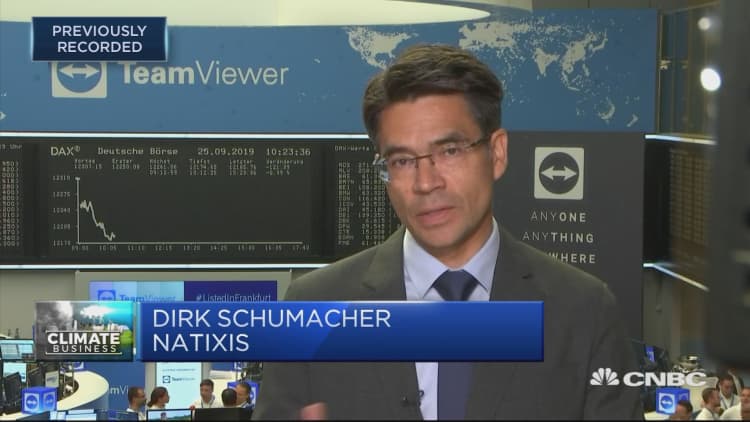No investor can afford to ignore climate change. It poses a business-critical risk for global companies and a systemic challenge to the financial system. With the consequences of climate change already being felt, it will increasingly impact all economies, asset classes and industries, whether directly or indirectly.
Without greater action, we can expect an estimated $23 trillion in global losses over the next 80 years in line with a 4°C rise in global temperatures. This can be avoided, but it requires far bolder and more urgent action in driving forward and adapting to the necessary transition to a clean global economy.
As the governors of the Bank of England and Bank of France explain, "If some companies and industries fail to adjust to this new world, they will fail to exist."
It is incumbent on companies to embrace necessary changes in corporate strategy. Those that do have opportunity to thrive.
Unparalleled shareholder muscle at work
This is why 370-plus investors with more than $35 trillion in assets under management are working through Climate Action 100+ to engage 161 global companies worldwide that are collectively responsible for over two-thirds of global industrial greenhouse gas emissions. Supported by five investor networks — AIGCC, Ceres, IGCC, IIGCC and PRI — as partner organizations behind the initiative, this is unparalleled shareholder muscle at work in looking to ensure the world's largest corporate emitters align their business strategies with the goals of the Paris Agreement on climate change.
Ownership brings responsibility, and investors increasingly appreciate their need to act. The significance of addressing climate and transition-related risk means, in line with fiduciary responsibility, many investors are becoming increasingly active in their stewardship of assets. A new norm is being established in the process and investor shareholder engagement taken mainstream, opening up a new front in the drive to decarbonize the global economy.

Significant outcomes have been achieved. A focus on issues such as lobbying, disclosure and executive remuneration are setting new standards on corporate governance. High-profile investor-led agreements reached with companies including Shell, Glencore, BP and Equinor have transformed the conversation on decarbonization across their sectors. Engagement has helped drive a number of groundbreaking commitments to achieve net-zero emissions, including from companies in some of the toughest sectors to decarbonize.
While this momentum is significant, less than 1 in 10 of the 161 companies on the Climate Action 100+ focus list is currently working toward a business strategy aligned with the goals of the Paris Agreement. Too many companies are playing catch-up, and a critical ambition gap remains. None of this is necessarily simple or straightforward. Approaches will, of course, be sector- and company-specific. But the longer the issue is avoided, the greater the risk faced by the companies in question. Challenges will be compounded as competitors press ahead and secure the competitive advantage and resilience offered by being "Paris aligned."
The benefits that collaboration with investors offers are clear and to be embraced. Strengthening corporate governance, bringing emissions in line with the goals of the Paris Agreement and improving climate-related financial disclosures all help build stronger, more resilient companies.
It is down to the firms in which we invest, and our collective responsibility as investors, to ensure they seize the benefits on offer rather than face the costs of failure.
The future of the climate and the returns of investments on which our beneficiaries depend is completely intertwined. We know what we need to achieve, and there is no time to waste in getting there. The latest science shows that we need to have completed the move to a clean economy globally, based on net-zero emissions, by 2050.
The message from the United Nations' climate summit last week was clear: This is not only a necessity but an unmissable opportunity. World leaders, investors and companies are already working together to ensure it becomes a reality. Sixty-five countries and the EU are now committed to pursuing sweeping economy-wide decarbonization to achieve net-zero emissions by 2050 or earlier. The UK and France already have targets passed into law. Others will increasingly join them.
Investors need to avoid failure
Investors will be making clear the need for companies they engage across all sectors to articulate how their businesses are compatible with this carbon-neutral future. This includes coming forward with net-zero commitments, supported by appropriate business plans and targets covering both operational and value chain emissions attributable to the company.
Those companies working to capitalize on the opportunity will be supported by investors every step of the way. They also will increasingly act where boards fall short on their corporate governance responsibilities. Lack of action is not an option when it comes to climate change, and investors will increasingly ensure this is understood.
Just as companies need to double down on progress, so too do investors in pressing the case for, and benefits of, necessary transition. This must be broader than any one initiative alone, however large. This is why broader collaboration is key.
The transition to a clean global economy is already under way, and completing the journey has never been more achievable or more desirable. The choice for companies is clear: Innovate and adapt or face being left behind. It is down to the firms in which we invest, and our collective responsibility as investors, to ensure they seize the benefits on offer rather than face the costs of failure.
—By Stephanie Maier, director of responsible investment at HSBC Global Asset Management, on behalf of the Climate Action 100+ steering committee, of which she is a member.




